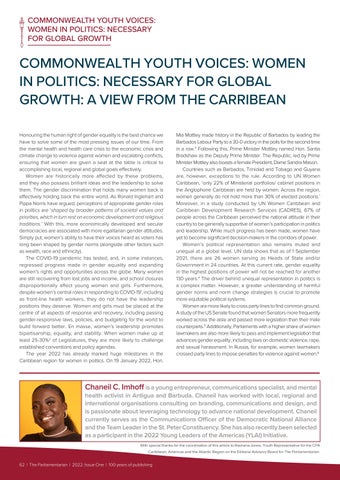COMMONWEALTH YOUTH VOICES: WOMEN IN POLITICS: NECESSARY FOR GLOBAL GROWTH
COMMONWEALTH YOUTH VOICES: WOMEN IN POLITICS: NECESSARY FOR GLOBAL GROWTH: A VIEW FROM THE CARRIBEAN Honouring the human right of gender equality is the best chance we have to solve some of the most pressing issues of our time. From the mental health and health care crisis to the economic crisis and climate change to violence against women and escalating conflicts, ensuring that women are given a seat at the table is critical to accomplishing local, regional and global goals effectively. Women are historically more affected by these problems, and they also possess brilliant ideas and the leadership to solve them. The gender discrimination that holds many women back is effectively holding back the entire world. As Ronald Inglehart and Pippa Norris have argued, perceptions of appropriate gender roles in politics are ‘shaped by broader patterns of societal values and priorities, which in turn rest on economic development and religious traditions.’ With this, more economically developed and secular democracies are associated with more egalitarian gender attitudes. Simply put, women’s ability to have their voices heard as voters has long been shaped by gender norms (alongside other factors such as wealth, race and ethnicity). The COVID-19 pandemic has tested, and, in some instances, regressed progress made in gender equality and expanding women’s rights and opportunities across the globe. Many women are still recovering from lost jobs and income, and school closures disproportionally affect young women and girls. Furthermore, despite women’s central roles in responding to COVID-191, including as front-line health workers, they do not have the leadership positions they deserve. Women and girls must be placed at the centre of all aspects of response and recovery, including passing gender-responsive laws, policies, and budgeting for the world to build forward better. En masse, women’s leadership promotes bipartisanship, equality, and stability. When women make up at least 25-30%2 of Legislatures, they are more likely to challenge established conventions and policy agendas. The year 2022 has already marked huge milestones in the Caribbean region for women in politics. On 19 January 2022, Hon.
Mia Mottley made history in the Republic of Barbados by leading the Barbados Labour Party to a 30-0 victory in the polls for the second time in a row.3 Following this, Prime Minister Mottley named Hon. Santia Bradshaw as the Deputy Prime Minister. The Republic, led by Prime Minister Mottley also boasts a female President, Dame Sandra Mason. Countries such as Barbados, Trinidad and Tobago and Guyana are, however, exceptions to the rule. According to UN Women Caribbean, ‘only 22% of Ministerial portfolios/ cabinet positions in the Anglophone Caribbean are held by women. Across the region, women generally do not hold more than 30% of elected positions.’ Moreover, in a study conducted by UN Women Caribbean and Caribbean Development Research Services (CADRES), 67% of people across the Caribbean perceived the national attitude in their country to be generally supportive of women’s participation in politics and leadership. While much progress has been made, women have yet to become significant decision-makers in the corridors of power. Women’s political representation also remains muted and unequal at a global level. UN data shows that as of 1 September 2021, there are 26 women serving as Heads of State and/or Government in 24 countries. At this current rate, gender equality in the highest positions of power will not be reached for another 130 years.4 The driver behind unequal representation in politics is a complex matter. However, a greater understanding of harmful gender norms and norm change strategies is crucial to promote more equitable political systems. Women are more likely to cross party lines to find common ground. A study of the US Senate found that women Senators more frequently worked across the aisle and passed more legislation than their male counterparts.5 Additionally, Parliaments with a higher share of women lawmakers are also more likely to pass and implement legislation that advances gender equality, including laws on domestic violence, rape, and sexual harassment. In Russia, for example, women lawmakers crossed party lines to impose penalties for violence against women.6
Chaneil C. Imhoff is a young entrepreneur, communications specialist, and mental
health activist in Antigua and Barbuda. Chaneil has worked with local, regional and international organisations consulting on branding, communications and design, and is passionate about leveraging technology to advance national development. Chaneil currently serves as the Communications Officer of the Democratic National Alliance and the Team Leader in the St. Peter Constituency. She has also recently been selected as a participant in the 2022 Young Leaders of the Americas (YLAI) Initiative. With special thanks for the coordination of this article to Rashana Jones, Youth Representative for the CPA Caribbean, Americas and the Atlantic Region on the Editorial Advisory Board for The Parliamentarian.
62 | The Parliamentarian | 2022: Issue One | 100 years of publishing



